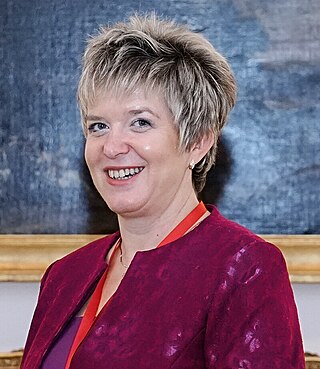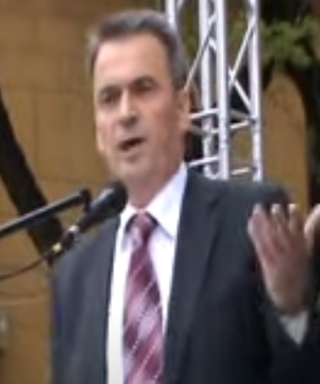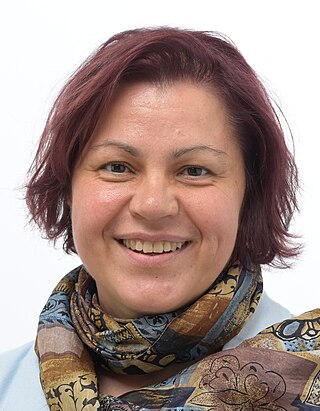
The Alliance of Vojvodina Hungarians is a regionalist political party in Serbia, representing the Hungarian minority.
Árpád Fremond is a Serbian politician from the country's Hungarian community. He served in the Serbian parliament from 2008 to 2022 and has led Serbia's Hungarian National Council since December 2022. Fremond is a member of the Alliance of Vojvodina Hungarians (VMSZ)

Elvira Kovács is a Serbian politician from the country's Hungarian community. She has served in the Serbian parliament since 2007 as a member of the Alliance of Vojvodina Hungarians (VMSZ).

Milorad Mirčić is a Serbian politician. He is a prominent figure in the far-right Serbian Radical Party (SRS) and has served several terms as an elected official at the local, provincial, and republic levels. Mirčić was the mayor of Novi Sad from 1993 to 1994 and the minister of the Serb diaspora in the Serbian government from 1998 to 2000.
Zoltán Pék is a Serbian politician from the country's Hungarian community. He was the mayor of Senta from 2008 to 2010 and a member of the National Assembly of Serbia from 2012 to 2022, and now serves in the Senta municipal assembly. Pék is a member of the Alliance of Vojvodina Hungarians (VMSZ).
József F. Varga is a former politician in Serbia from the country's Hungarian community. He was a member of the Assembly of Vojvodina from 1992 to 2004 and has held prominent municipal office in Bečej.

Nada Kolundžija is a politician in Serbia. She has served several terms in the National Assembly of Serbia, initially with the Democratic Alternative and later with the Democratic Party. She also served in the Assembly of Serbia and Montenegro from 2003 to 2004. Kolundžija was expelled from the DS in 2020 against the backdrop of a larger purge of the party's membership.
Andrea Galgó Ferenci was a Serbian politician from the country's Hungarian community. She was briefly a member of the Serbian parliament in 2007, serving with the Alliance of Vojvodina Hungarians (VMSZ).
Géza Kucsera is a politician and community representative in Serbia. A member of the country's Hungarian national minority community, he served in the Assembly of Vojvodina from 2000 to 2004 and was the mayor of Subotica from 2003 to 2008. During his time in public life, Kucsera was a member of the Alliance of Vojvodina Hungarians.
Károly Pál is a politician in Serbia from the country's Hungarian national minority community. He has at different times served in the National Assembly of Serbia and the Assembly of Vojvodina and has held high municipal office in Mali Iđoš. For most of his political career, Pál has been a member of the Alliance of Vojvodina Hungarians.
Áron Csonka is a Serbian politician. An ethnic Hungarian, he has been the leader of the Democratic Fellowship of Vojvodina Hungarians. He was a member of the Assembly of Vojvodina from 2016 to 2020.
Mihály Nyilas is an ethnic Hungarian politician in Serbia. He was the mayor and Kanjiža from 2008 to 2014 and was a deputy prime minister of Vojvodina from 2014 to 2020. He is now a secretary of state in Serbia's ministry of justice. Nyilas is a member of the Alliance of Vojvodina Hungarians.

Annamária Vicsek is a Serbian politician from the country's Hungarian community. She has been a member of the European Parliament since July 2024, serving with Hungary's national delegation as a member of Fidesz. She previously served two terms in the Serbian national assembly and was a secretary of state in Serbia's education ministry from 2016 to 2024. In Serbian politics, Vicsek is a member of the Alliance of Vojvodina Hungarians (VMSZ), which is aligned with Fidesz.

The League for Šumadija, also known as the Šumadija Coalition, was a regionalist political party in the Šumadija region of Serbia in the late 1990s and 2000s. The party was one of the constituent members of the Democratic Opposition of Serbia from 2000 to 2003. Its leader, Branislav Kovačević, was a member of the National Assembly of Serbia from 2001 to 2004 and served on the DOS presidency.
Rozália Ökrész is a Serbian politician from the country's Hungarian community. She served in the Serbian parliament from 2020 to 2024 as a member of the Alliance of Vojvodina Hungarians (VMSZ).
Borisz Bájity is a Serbian politician from the country's Hungarian community. He is a delegate in Serbia's Hungarian National Council and has served in the National Assembly of Serbia since February 2024. Bájity is a member of the Alliance of Vojvodina Hungarians (VMSZ).
József Tóbiás is a Serbian politician from the country's Hungarian community. He served in the Assembly of Vojvodina from 2008 to 2016, has been the president of the Ada municipal assembly since 2020, and has served in the National Assembly of Serbia since February 2024. Previously with the Democratic Party (DS), Tóbiás has been a member of the Alliance of Vojvodina Hungarians (VMSZ) since 2018.
Emese Úri is a Serbian medical doctor, administrator, and politician from the country's Hungarian community. She is currently serving her second term in the National Assembly of Serbia. Úri is a member of the Alliance of Vojvodina Hungarians (VMSZ).
Hajnalka Burány is a Serbian politician from the country's Hungarian community. She has been the mayor of Senta since July 2024 and previously served in the Vojvodina provincial assembly on an almost uninterrupted basis from 2020 to 2024. Burány is a member of the Alliance of Vojvodina Hungarians (VMSZ).
Dániel Gyivánovity is a Serbian politician from the country's Hungarian community. He served in the Serbian parliament from 2020 to 2022 and has been the president of the Subotica city assembly since July 2024. Gyivánovity is a member of the Alliance of Vojvodina Hungarians (VMSZ).






